World
Honduras government institutions ‘are murdering us’
Lack of opportunities, violence prompt LGBTQ people to migrate
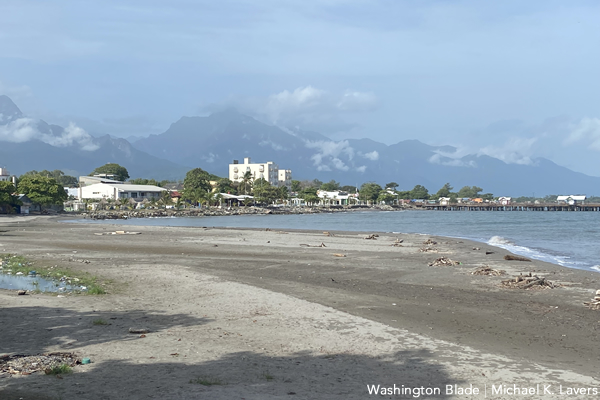
Editor’s note: International News Editor Michael K. Lavers was on assignment for the Washington Blade in Honduras, El Salvador and Mexico from July 11-25.
LA CEIBA, Honduras — Leonela and Jerlín, her partner of 11 years, and their school-age daughter live in La Ceiba, a city on Honduras’ Caribbean coast.
Jerlín was a bus driver in San Pedro Sula, the country’s commercial capital, until gang members shot him three times in 2012 because he couldn’t pay the extortion money from which they demanded from him each month. Jerlín, Leonela and their daughter subsequently fled to La Ceiba, which is about three hours east of San Pedro Sula.
“We left,” Jerlín told the Washington Blade on July 20 during an interview at the offices of Organización Pro Unión Ceibeña (Oprouce), a La Ceiba-based advocacy group. “We fled from there.”
Jerlín migrated to Mexico in January 2019, but returned to Honduras less than a month later because Leonela was in the hospital. The couple and their daughter migrated to Mexico a year later.
Leonela asked for a Mexican humanitarian visa for her and her daughter once they arrived in Ciudad Hidalgo, a Mexican border city that is across the Suchiate River from Tecún Umán, Guatemala.
Leonela told the Blade that she planned to ask for asylum in Mexico and wanted to go to Tuxtla Gutiérrez, the capital of Mexico’s Chiapas state, to find work. Leonela said she and Jerlín instead decided to return to Honduras because they did not want their daughter to further endure the “inhumane” conditions of the migrant detention center in Tapachula, a city that is roughly 20 miles northwest of Ciudad Hidalgo, in which they were living.
“We decided it was better to allow them to deport us,” said Jerlín.
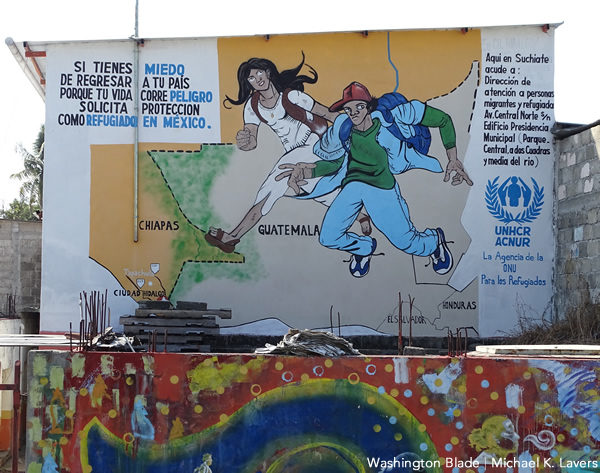
Jerlín, Leonela and their daughter returned to Honduras in May 2020. Someone shot at their house on July 10, 2020.
“They couldn’t even do what people wanted them to do, perhaps even buring us alive,” said Leonela.
Leonela and Jerlín are among the many LGBTQ Hondurans who have decided to leave Honduras in order to escape violence and discrimination based on sexual orientation and gender identity.
Vice President Kamala Harris and other Biden administration officials have acknowledged anti-LGBTQ violence is one of the “root causes” of migration from Honduras and neighboring Guatemala and El Salvador.
Title 42, a Centers for Disease Control and Prevention rule that closed the Southern border to most asylum seekers and migrants because of the coronavirus pandemic, remains in place. The White House has repeatedly told migrants not to travel to the U.S.
Roxsana Hernández, a trans Honduran woman with HIV, died at a New Mexico hospital on May 25, 2018, while in U.S. Immigration and Customs Enforcement custody.
Natasha, another trans Honduran woman, arrived in Matamoros, a Mexican border city that is across the Rio Grande from Brownsville, Texas, on Oct. 12, 2019. The previous administration forced her to pursue her U.S. asylum case in Mexico under its Migrant Protection Protocols. (The U.S. Supreme Court on Tuesday ordered the Biden administration to reinstate MPP.)
The Blade interviewed Natasha on Feb. 27 at a Matamoros shelter that Rainbow Bridge Asylum Seekers, a program for LGBTQ asylum seekers and migrants that Resource Center Matamoros, a group that provides assistance to asylum seekers and migrants in the Mexican border city, helped create. The U.S. less than two weeks later allowed Natasha to enter the country.
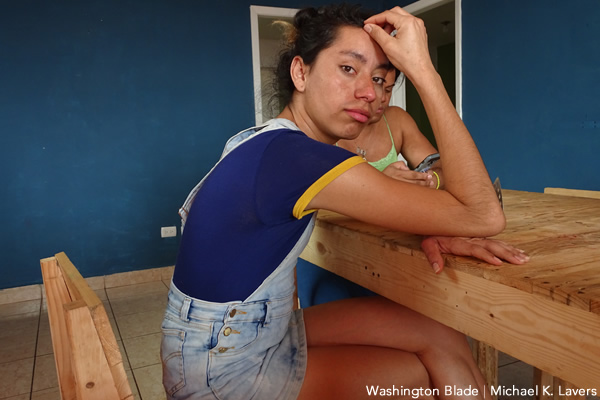
Oprouce Executive Director Sasha Rodríguez, who is trans, has participated in the State Department’s International Visitor Leadership Program.
She said a lack of employment and housing associated with the pandemic has prompted more Hondurans to migrate to the U.S., Mexico and Costa Rica. Rodríguez also told the Blade the U.S. and “our countries sell an American dream that doesn’t exist.”
“Why don’t these American organizations say don’t go,” she said, specifically referring to trans people who have decided to leave Honduras. “Here they see it as beautiful. They are already in the United States, but they were raped while trying to get there. They were kidnapped.”
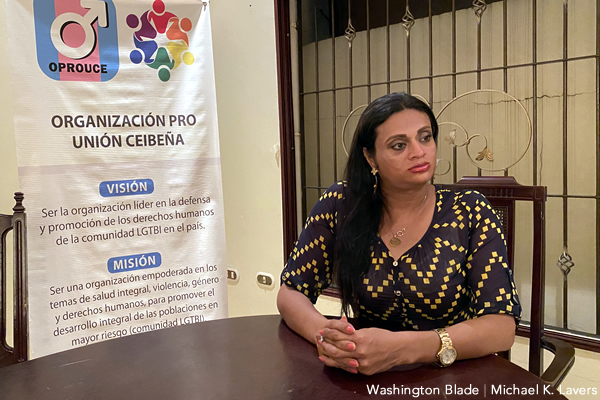
Alexa, a 27-year-old trans woman from La Ceiba, told the Blade she has friends who live in Mexico. Alexa said she would like to leave Honduras, but she doesn’t want to leave her mother alone.
“I don’t want to leave her alone and abandon her because I have always fought for her,” Alexa told the Blade during an interview at Oprouce. “She supports me as a woman.”
Alexa said she served a nearly 3-year prison sentence for attempted murder, even though she was defending herself against a woman who was hitting her in the face with a rock. Alexa began to sob when she started to tell the Blade about the Salvadoran man who raped her in prison. She said the warden then forced her to cut her hair and guards doused her with “ice cold water” in an isolation cell.
“I was a woman,” said Alexa. “They made me a man.”
Alexa told the Blade that other prisoners tried to kill her. She said she also tried to die by suicide several times until her release on Jan. 27.
Alexa said she has not been able to find a job since she left prison. She also told the Blade that gang members continue to threaten her.
“It is sometimes very difficult to lead the lifestyle that we lead as trans women in Honduras,” she said, referring to anti-trans discrimination and a lack of employment opportunities.
Venus, a 30-year-old trans woman who is also from La Ceiba, echoed Alexa.
“To be a trans person is synonymous with teasing, harassment, violence and even death,” Venus told the Blade at Oprouce.
Venus said Honduran soldiers regularly attack trans women. She told the Blade a lack of access to health care, machismo and patriarchal attitudes are among the myriad other issues that she and other trans Hondurans face.
“We don’t have access to education, to health (care), to a job,” said Venus. “Above all we are fighting for a gender-based law that recognizes us as women and men.”
Venus added she, like Alexa, would leave Honduras “if I was given the opportunity to do so.”
Landmark ruling finds Honduras responsible for trans woman’s murder
Red Lésbica Cattrachas, a lesbian feminist human rights group based in Tegucigalpa, the Honduran capital, notes 373 LGBTQ Hondurans were reported killed in the country between 2009-2020.
Statistics indicate 119 of those murdered were trans. Red Lésbica Cattrachas also noted 18 of the LGBTQ Hondurans who were reported killed were in Atlántida department in which La Ceiba is located.
Vicky Hernández was a trans activist and sex worker with HIV who worked with Colectivo Unidad Color Rosa, a San Pedro Sula-based advocacy group.
Hernández’s body was found in a San Pedro Sula street on June 29, 2009, hours after the coup that ousted then-President Manuel Zelaya from power. Hernández and two other trans women the night before ran away from police officers who tried to arrest them because they were violating a curfew.
The Inter-American Court of Human Rights in June issued a landmark ruling that found Honduras responsible for Hernández’s murder.
The ruling ordered Honduras to pay reparations to Hernández’s family and enact laws that protect LGBTQ people from violence and discrimination. The government of President Juan Orlando Hernández, whose brother, former Congressman Juan Antonio “Tony” Hernández, is serving a life sentence in the U.S. after a federal jury convicted him of trafficking tons of cocaine into the country, has not publicly responded to the ruling.
Rodríguez noted to the Blade that Oprouce and other advocacy groups have been fighting for a trans rights law in Honduras for more than a decade.
“We have had failure for 11 years, but I think that with what happened with the Inter-American Court, the recommendations that have come from the Vicky Hernández case could achieve something important,” said Rodríguez. “There are very good human rights recommendations for Honduras and there are good recommendations that Honduras could automatically apply to trans women.”
Rodríguez as she discussed the ruling reiterated trans Hondurans continue to face violence, discrimination and a lack of employment opportunities. Rodríguez also reiterated her sharp criticism of her country’s government and its institutions.
“Societal exclusion forces us to do sex work,” she said. “We are being harmed by our trade: Murder, persecution, hate crimes, torture, beatings.”
“I always say that it is an institutional death because state institutions are murdering us,” added Rodríguez.
‘My fight is here’
In spite of these challenges, Rodríguez said there has been progress.
Oprouce — which works on a variety of issues that include the prevention of gender-based violence and fighting HIV/AIDS — offers workshops to the Public Ministry, the Honduran Armed Forces and judges. Asociación de Prevención y Educación en Salud, Sexualidad, Sida y Derechos Humanos (Aprest), another advocacy group in Tela, a city that is about 60 miles west of La Ceiba, conducts similar trainings with local and national authorities.
Aprest Executive Director Leonel Barahona Medina told the Blade during an interview at a beachfront restaurant in Tela on July 20 that city officials have given him an office from which he and his colleagues can work. Barahona said they also supported activists who raised the Pride flag on June 27 in front of Tela City Hall.
A similar ceremony took place in a park in the center of La Ceiba.
“We have good relations with them,” said Barahona, referring to Tela officials.
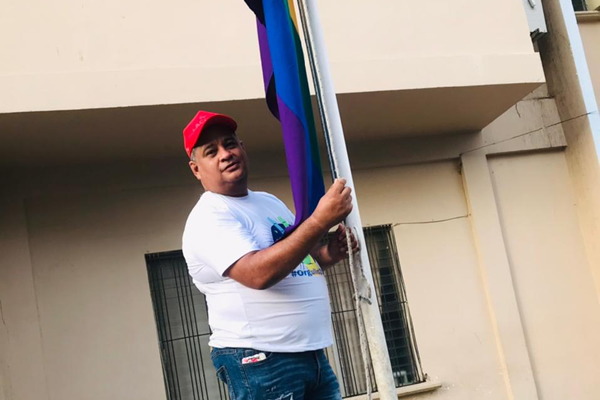
Both Barahona and Rodríguez said their work will continue.
“My fight is here,” said Rodríguez. “My essence and my dreams are here.”
Abdiel Echevarría-Caban and Reportar sin Miedo contributed to this story.

The Mexican Senate on Thursday approved a bill that would ban so-called conversion therapy in the country.
Yaaj México, a Mexican LGBTQ rights group, on X noted the measure passed by a 77-4 vote margin with 15 abstentions. The Chamber of Deputies, the lower house of Mexico’s congress, approved the bill last month that, among other things, would subject conversion therapy practitioners to between two and six years in prison and fines.
The Senate on its X account described conversion therapy as “practices that have incentivized the violation of human rights of the LGBTTTIQ+ community.”
“The Senate moved (to) sanction therapies that impede or annul a person’s orientation or gender identity,” it said. “There are aggravating factors when the practices are done to minors, older adults and people with disabilities.”
Mexico City and the states of Oaxaca, Quintana Roo, Jalisco and Sonora are among the Mexican jurisdictions that have banned the discredited practice.
The Senate in 2022 passed a conversion therapy ban bill, but the House of Deputies did not approve it. It is not immediately clear whether President Andrés Manuel López Obrador supports the ban.
Canada, Brazil, Belgium, Germany, France, and New Zealand are among the countries that ban conversion therapy. Virginia, California, and D.C. are among the U.S. jurisdictions that prohibit the practice for minors.
South America
Argentina government dismisses transgender public sector employees
Country’s Trans Labor Quota Law enacted in 2021

Protests have broken out across Argentina in recent weeks after the dismissal of transgender people from their government jobs.
President Javier Milei’s action is in stark contract with the progress seen in 2023, where the government’s hiring of trans people increased by 900 percent within the framework of the Trans Labor Quota Law that had been in place since 2021.
Among those affected is Sofia Diaz, a “survivor” who shared her testimony with the Washington Blade hours after she traveled from Chaco Province to Buenos Aires to protest her dismissal.
Presentes, an LGBTQ news agency, reported the government dismissed more than 85 trans employees in less than two weeks.
Diaz, 49, holds a degree in combined arts. She joined the National Social Security Administration (ANSES) in 2022 under the Trans Labor Inclusion Law. The layoffs began in January and left many people feeling uncertain and anguished. It was her turn a few days ago.
Diaz in an interview recounted how the situation became progressively more complicated, with difficulties in accessing information about her employment status and the eventual confirmation of dismissals through WhatsApp messages. This government action, according to Diaz, violates the law.
“We were on a Friday, I think on March 24, in the office and we have a WhatsApp group of other colleagues from all over Argentina who entered through the trans labor quota and they tell us if we can get our pay stubs on the intranet,” Diaz recalled. “So, I tried to enter, I could not, I talked to two other colleagues and they told me no, they could not, and so we went to another person. He couldn’t either.”
“Some people told us that it could be a system error. Well, we were never calm, let’s say not how this issue of installing fear and the perversion with which they do it ends,” she added. “This sadism of … inflicting pain and speculating with your misfortune and so on … is something that characterizes Javier Milei’s government.”
Diaz recalled a list of those dismissed from the agency began to circulate from the union in the afternoon. A colleague passed it on to her, “and well, unfortunately I was also on that list.”
“At that moment the whole weekend went by with anguish, crying, and talking with other colleagues from other places, not only trans, but everyone, everyone and everyone,” she said. “On Monday when we went to try to enter, we could not enter with the biometric, which is the thumb we had to use every morning to enter.”
Despite the difficult moment through which she is going, the trans activist stressed to the Blade that she will continue protesting and will even sue the government because her dismissal is illegal and “violates the constitution itself.”
The LGBTQ community and its allies have mobilized and organized demonstrations, highlighting the importance of defending the rights won and fighting against discrimination and exclusion. Diaz emphasized the fight is not only for the people affected today, but also for future generations, saying the historical memory of the struggles for inclusion and social justice must be kept alive.
“The Argentine government thus faces a key challenge in human and labor rights, where public pressure and social mobilization can play a determining role in protecting the rights of LGBTQ+ people,” Diaz said.
Africa
For queer Nigerians, being on gay dating apps is still a risk
Homophobes target users for violence

Gay hookup apps like Grindr, and dating apps like Tinder and Bumble have managed to proliferate queer communities in countries like Nigeria.
Those who seek one night stands find what they want while those looking for love equally find what they seek. These platforms have managed to position themselves as safe spaces for queer people in anti-gay Nigeria. In recent times, however, it is proving to be unsafe, as homophobic people are quickly learning about the apps, and opening accounts that either seek to outrightly threaten queer people, or pretend to be queer, have long chats with gay people, invite them over, and inflict violence on them.
Take the case of Biodun, a queer Nigerian man who joined Grindr to meet up with guys like him.
After Biodun had built a connection and agreed to meet with someone whose display name was “Mamba,” they decided to meet up only for him to be met with violence. Apparently, Mamba ran a catfish account.
“I’ll never forget that day,” Biodun, who asked the Washington Blade not to use his last name because of safety concerns, said. “I still think about it, and sometimes blame myself for being very careless, even though Grindr was supposed to be our safe space.”
Biodun’s experience isn’t peculiar to him.
In Nigeria, draconian laws that criminalize same-sex relationships exist, making queer people turn to the digital realm to explore their identities and seek connections beyond the confines of societal oppression that comes with the physical environment. Gay dating apps such as Grindr, therefore, have emerged as virtual sanctuaries, offering spaces for queer Nigerians to forge friendships, find solidarity, and pursue romantic or sexual relationships. Spaces like this, however, have morphed into a landscape fraught with danger, as homophobic people have weaponized these platforms to perpetuate hate and violence.
“Sometimes, I often wonder how they learned about these platforms,” Daniel, which is not his real name, told the Blade. “You would think that it is just us in the platforms, until you find out that the accounts are rooted in homophobia.”
One time, someone’s bio read, “I’m only here to deal with the gay people. I know all of you, and I will find and kill you. We no want una for here (translates to we do not want you here, in English.)” It was a stark reminder that these spaces are no longer LGBTQ-friendly for Nigerians. In 2014, there was the passage of the Same-Sex Marriage Prohibition Act by former President Goodluck Jonathan, which not only criminalized same-sex unions, but also imposed severe penalties on anyone involved in LGBTQ advocacy or support.
This law catalyzed a surge in discrimination and violence against queer Nigerians; emboldening regular civilians, religious extremists, and even law enforcement agencies to target individuals perceived as deviating from traditional gender and sexual norms. Again, amid this hostile environment, gay dating apps emerged as lifelines for many queer Nigerians, offering avenues for discreet communication, community building, and the pursuit of intimate relationships.
The very anonymity and freedom these apps provided, however, became double-edged swords.
The advent of screenshot and screen-recording capabilities on these apps, for example, reduced the risks of exposure, strengthening the safety and privacy of users. However, this also comes with its own lapses, as queer people using Grindr have often relied on screenshots and screen recordings to confirm the identities of potentials with their friends, before accepting to meet.
“Before the removal of the screenshot option, I usually shared photos of others with my trusted friends,” Biodun shared. “But since that was taken off, there was no way for me to do that.”
Although, according to Grindr’s terms and conditions, the removal came with privacy concerns, as it was to facilitate a safe dating experience.
This erosion of digital safe spaces is depriving queer Nigerians of vital avenues for self-expression and affirmation,and is exacerbating the psychological toll of living in a society that continues to systematically demonize their identities. Moreover, the normalization of homophobic rhetoric and violence in both physical and digital realms has perpetuated a cycle of fear and oppression, and is reinforcing this notion that LGBTQ individuals are inherently unworthy of dignity and respect. Despite these challenges, though, the resilience of queer Nigerians continue to persist, as they defy societal norms and assert their right to love and be loved.
-

 State Department3 days ago
State Department3 days agoState Department releases annual human rights report
-

 Maryland5 days ago
Maryland5 days agoJoe Vogel campaign holds ‘Big Gay Canvass Kickoff’
-

 Politics4 days ago
Politics4 days agoSmithsonian staff concerned about future of LGBTQ programming amid GOP scrutiny
-

 District of Columbia1 day ago
District of Columbia1 day agoCatching up with the asexuals and aromantics of D.C.












